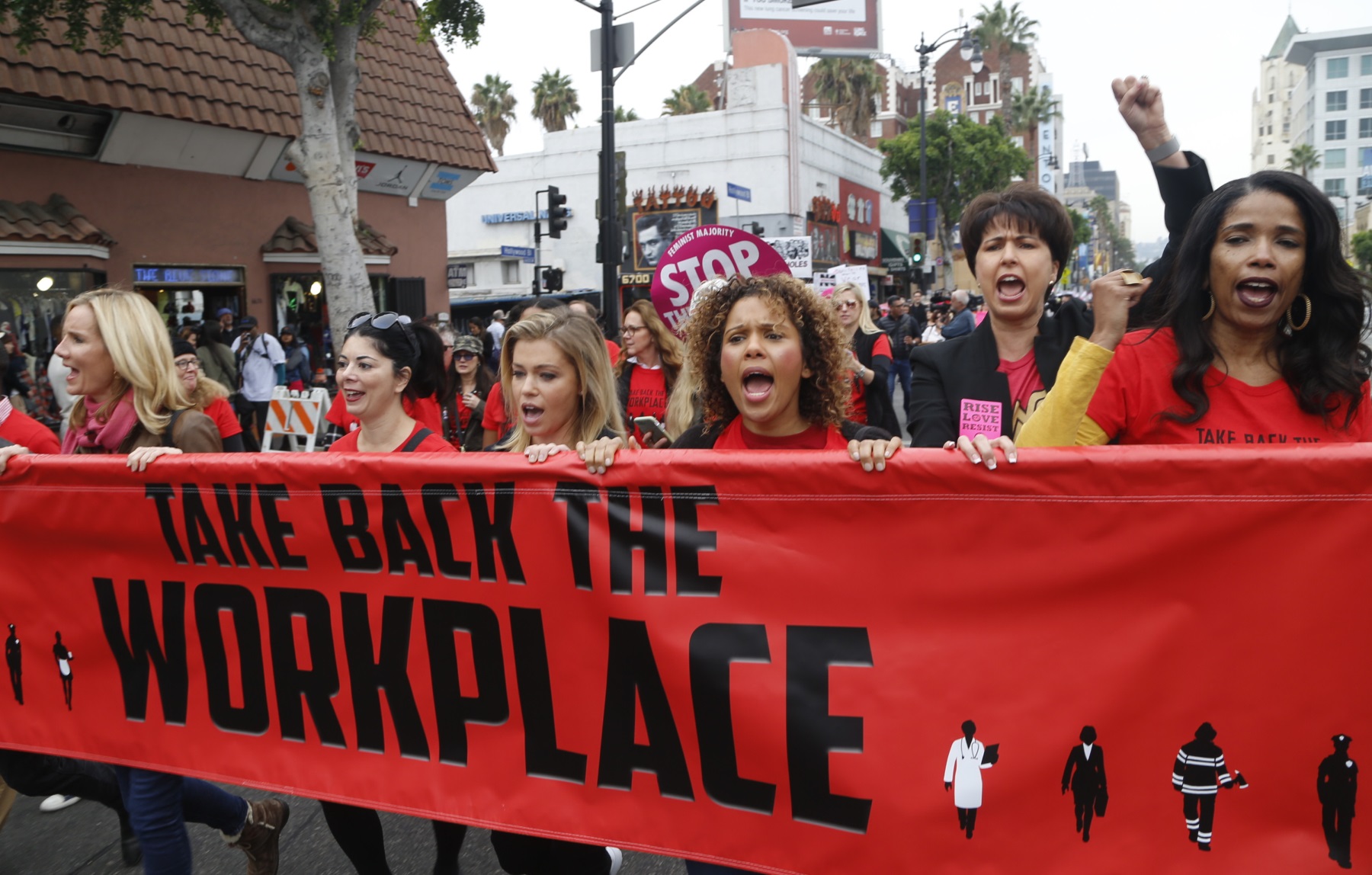Atlanta Companies Want Lasting Culture Change Around Sexual Harassment

Participants march against sexual assault and harassment at the November #MeToo March in Los Angeles. With allegations against well-known people and the growing #MeToo movement in the national news, human resources professionals have been working to address sexual harassment concerns in Atlanta.
Damian Dovarganes / Associated Press
Following the wave of allegations against celebrities like Harvey Weinstein and inspired by the #MeToo movement, Atlanta companies aren’t just dusting off old training videos. They are pushing for a more lasting culture change.
Human resources professionals in Atlanta have been working overtime to address sexual harassment concerns.
‘Shock and Outrage’
Karen Hilton is president of TAP Executive Coaching and executive vice president of the local Society for Human Resource Management affiliate (SHRM-Atlanta).
“HR practitioners are members of the workforce, and we feel the same sense of outrage. What in the world happened?” Hilton said. “Across the board, there’s shock and outrage, disappointment, disbelief even. It’s horrible that it’s happening.”
She said competent HR professionals know how to handle sexual harassment allegations.
“We treat every claim, whether or not it leads to a full-blown investigation, with incredible care and incredible concern,” Hilton said. “But you will always find exceptions to the rule. Organizations of all sizes — small, medium and large — that have these horrible situations where everything went wrong.”
A 2016 Equal Employment Opportunity Commission report said 3 out of 4 people who experience harassment never tell their supervisor and it’s underreported.
Reviewing Policies
Barbara Bell-Dees is vice president of human resources at the Atlanta-based health technology firm NASCO and executive vice president for SHRM-Atlanta.
“It seems as though as it’s just coming out of the woodwork, and so what it does for many of us in our profession is to remind us to make sure that the things we do that one would expect an HR professional to be doing,” Bell-Dees said. “To make sure that we have all of the practices, all of the policies, training, all of the processes in place to do everything we can to alleviate this from our own organizations. But at the same time, being sensitive to the fact that as crazy as it sounds and as frequently as we’re hearing about, in fact it does go on.”
Bell-Dees said she feels fortunate that it is not a common issue at NASCO, which has more than 900 employees in Atlanta.
“At our company, we have foundational policies in place that we require all of our associates to be trained on every year,” Bell-Dees said. “We take that so seriously that we’ve even gone as far as tying their eligibility for their annual bonus to the fact that they complete mandated training. We learned that what gets tied to the wallet actually gets done.”
‘Silent Whistle’
She said all managers are also required to attend annual meetings with an employment labor attorney and allows employees to report inappropriate behavior anonymously, which she called “silent whistle opportunities.”
“That is just to remind all managers that it goes beyond just what happens at NASCO. They, too, personally can be impacted in the event that something like this goes on,” Bell-Dees said. “I think it’s about the constant education and awareness that we do that helps create a culture where it’s absolutely without a doubt known that sexual harassment is just not tolerated within the company.”
Superstar Harassers
Stephen Paskoff is a former trial attorney and investigator with the EEOC. He started his own HR firm Employment Learning Innovations, which trains employees and managers on workplace conduct.
“You have organizations who tolerate and have tolerated the conduct of what they call superstar harassers,” Paskoff said. “Let them get away with outrageous issues as we’ve seen in some of the cases in the news and then pay people off or hope nothing happens.”
The EEOC first recognized sexual harassment as discrimination 30 years ago. Since then, Paskoff said many companies have focused on avoiding lawsuits and scrutiny from the EEOC.
“People have been so used to thinking: ‘We set up policies, do once-a-year training,’” Paskoff said. “‘That should be enough, right?’ And the answer is no.”
Forcing Change
He said companies can’t just mobilize their legal teams after an incident happens. They need to preemptively coach employees to ditch bad behaviors.
He said sexual harassment training should be in the category of safety signs on a factory floor or reminders to restaurant employees to wash their hands.
“Think of changing behavior in terms of the way people are treated with the same degree of intensity that you would think of if you had to change an operational process or a manufacturing process either to make money, to do safety or comply or some other standard that was nonnegotiable.”
He’s seen this shift with some of his clients, which includes some of Atlanta’s Fortune 500 companies. Some put up signs about harassment. Others send periodic email reminders about company policies.
Tech Startups
But many small companies and startups don’t have HR departments.
Mimi Vold owns an HR firm that works with the tech industry. She said there are a lot of tech startups in Atlanta, and they have something of a mantra.
“Growth at any rate, at any cost,” Vold said. “Move fast, break things, get stuff done.”
Vold said sexual harassment training isn’t a top priority for many startups.
“Not a whole lot of rules or oversight or governance in place,” Vold said. “That creates a potential blind spot for enabling harassment or bad behaviors.”
But she said she has seen a shift among startups since the national #MeToo campaign.
“Now more than ever, it’s being looked at seriously,” Vold said.
Atlanta Startups
Sexual harassment is now on the mind of Pavleen Thukral. He’s founder and CEO of a financial tech startup called Stackfolio at TechSquare Labs. He said Atlanta startups are working to protect their employees.
“I think CEOs and executive teams are starting to look at it as, instead of being worried about this, let’s look at this as an opportunity,” Thukral said. “We can now as an opportunity create more diverse workplaces. We as an opportunity have the ability to tap into the fact that other organizations are going to need frameworks with which to operate. You see a lot of companies starting to put together formal plans that they open source.”
Stackfolio only has 10 employees right now. But Thukral said once his startup doubles in size, which he expects could happen within the next two years, or “when it stops feeling like a small group,” he plans to hire an in-house HR professional.








